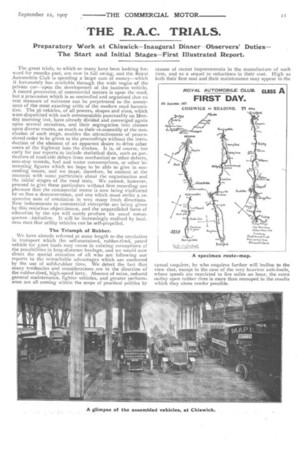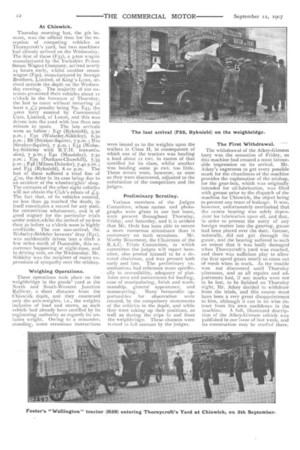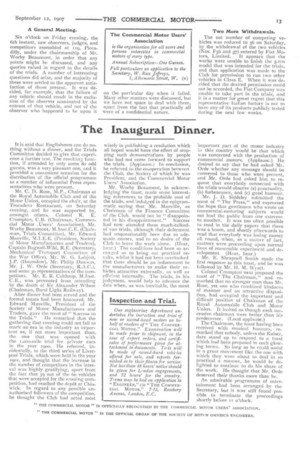THE R.A.C. TRIALS.
Page 11

Page 12

Page 13

If you've noticed an error in this article please click here to report it so we can fix it.
Preparatory Work at Chiswick—Inaugural Dinner -Observers Duties— The Start and Initial Stages—First Illustrated Report,
The great trials, to which so many have been looking forward for months past, are now in full swing, and the Royal Automobile Club is spending a large sum of money—which it fortunately has available through the wide vogue of the private car—upon the development of the business vehicle. A record procession of commercial motors is upon the road, but a procession which is so controlled and organised that no real measure of nuisance can be perpetrated to the annoyance of the most exacting critic of the modern road locomotive. The 56 vehicles, of all powers, shapes and sizes, which were dispatched with such commendable punctuality on Monday morning last, have already divided and converged again upon several occasions, and their segregation into classes upon diverse routes, as much as their re-assembly at the conclusion of each stage, enables the attractiveness of processional order to be given to the proceedings without the introduction of the element of an apparent desire to drive other users of the highway into the ditches. It is, of course, too early for our reports to include statistical data, such as particulars of road-side delays from mechanical or other defects, non-stop records, fuel and water consumptions, or other interesting figures which we hope to be able to give in succeeding issues, and we must, therefore, be content at the moment with some particulars about the organisation and the initial stages of the road tests. We cannot, however, proceed to give these particulars without first recording our pleasure that the commercial motor is now being vindicated by so fine a demonstration, and one which must strike a responsive note of emulation in very many fresh directions. New inducements to commercial enterprise are being given by this resistless object-lesson, and the unparalleled force of education by the eye will surely produce its usual consequence—imitation. It will be increasingly realised by business men that utility vehicles can be self-propelled.
The Triumph of Rubber.
We have already referred at some length to the revolution in transport which the self-contained, rubber-tired, petrol vehicle for 5-ton loads may cause in existing conceptions of the possibilities in long-distance haulage, and we would now direct the special attention of all who are following our reports to the remarkable advantages which are conferred by the use of solid-rubber tires. We detect the fact that many tendencies and considerations are in the direction of the rubber-tired, high-speed lorry. Absence of noise, reduced general maintenance, lighter vehicles, and greater performance are all coming within the scope of practical politics by reason of recent improvements in the manufacture of such tires, and as a sequel to reductions in their cost. High as both their first cost and their maintenance may appear to the casual enquirer, he who enquires further will incline to the view that, except in the case of the very heaviest axle-loads, where speeds are restricted to five miles an hour, the extra outlay upon rubber tires is more than recouped in the results which they alone render possible. At Chiswick.
Thursday morning last, the 5th instant, was the official time for the reception of competing vehicles at Thorn-ycroft's yard, hut two machines had already arrived on the \Vednesday. The first of these (F531, a 5-ton wagon manufactured by the Yorkshire Patent Steam Wagon Company, arrived nearly 24 hours early, whilst another steam wagon (F50), manufactured by Savage Brothers, Limited, of King's Lynn, arrived outside the depot on the Wednesday evening. The majority of the entrants presented their vehicles about I o'clock in the forenoon of Thursday, the last to enter without incurring at
least a penalty being No. E43, the 3-ton lorry entered by Commercial Cars, Limited, of Luton, and this was driven into the yard with less than one minute to spare. The late arrivals were as follow : E47 (Ryknield), 5.30 p. m. ; E32 (Wolseley-S iddeIey ), 6.30 p.m. ; B8 (Straker-Squire), 7 p.m. ; (Straker-Squire), 7 p.m.; E35 (Wolseley-Sidd-eley with B.T.H. transmission), 7 p.m.; E4o (Maudslay), 7.3o p.m. ; E39 (Durham-Churchill), 7.35 ; F48 (Milnes-Daimler), 7.40 p.m. ; and F5,5 (Ryknield), 8.ro p.m. The last of these suffered a total line of Lio, the delay in its case being due to an accident at the wheelwrights' shop. The entrants of the other eight vehicles will not obtain the Club's rebate of
The fact that, of 6o vehicles entered, no less than 59 reached the depot, in itself constitutes a record for any similar competition whatsoever, and is of good augury for the particular trials under notice,whilst the arrival of no less than 5o before 12 o'clock neon is highly creditable. The one non-arrival, the Wolseley-Siddeley brewers' dray (E31), was accidentally driven into a ditch a few miles north of Dunstable, this occurrence happening at night-time, and in driving rain, on the Wednesday. Mr. Siddeley was the recipient of many expressions of sympathy over the mishap.
Weighing Operations.
These operations took place on the weighbridge in the goods' yard at the North and South-Western Junction Railway, a short distance from the Chiswick depot, and they concerned only the axle-weights, i.e., the weights inclusiye of load and stores, as each vehicle had already been certified by its registering authority as regards its unladen weight. Owing to a misunderstanding, some erroneous instructions were issued as to the weights upon the trailers in Class H, in consequence of which one of the tractors was hauling a load about ii cwt. in excess of that specified for its class, whilst another was hauling some 30 cwt. too little_ These errors were, however, as soon as they were discovered, adjusted to the satisfaction of the competitors and the judges.
Preliminary Scrutiny.
Various members of the Judges Committee, whose names and photographs were given in our last issue, were present throughout Thursday, Friday, and Saturday, and it is evident that Mr. Orde has been able to secure a more numerous attendance than i8 customary on such occasions. Mr. Worby Beaumont, the Chairman of the R.A.C. Trials Committee, to which committee the judges will report hereafter, also proved himself to be a devoted chairman, and was present both early and late. The preliminary examinations had reference more specifically to accessibility, adequacy of platform area and convenience for loading, case of manipulating, finish and workmanship, general appearance, and manceuvring. Many favourable opportunities for observation were created, by the compulsory movements of the vehicles in the deptit, and while they were taking up their positions, as well as during the trips to and from the weighbridge. These chances were turned to full account by the judges.
The First Withdrawal. -
The withdrawal of the Atkey-Gimson lorry was the sensation of Friday, as this machine had created a most favour able impression on its arrival. Mr. Atkey's eagerness to get every possible mark for the cleanliness of the machine provides the explanation of the mishap, for the gear-box, which was originally intended for oil-lubrication, was filled with grease prior to the dispatch of the machine for Chiswick, the object being to prevent any trace of leakage. It was, however, unfortunately overlooked that the centre bearing was solely dependent for lubrication upon oil, and that, in order to prevent the entry of any foreign matter into the gearing, gauze had been placed over the duct. Grease, naturally, did not get through the gauze, and the bearing suffered to such an extent that it was badly damaged when Thornycroft's yard was reached, and there was sufficient play to allow the first speed gears nearly to come out of mesh when in work. As the trouble was not discovered until Thursday afternoon, and as all repairs and adjustments had, if any marks were not to be lost, to be finished on Thursday night, Mr. Atkey decided to withdraw from the trials, and this course must have been a very great disappointment to him, although it can in no wise detract from his own confidence in the machine. A full, illustrated description of the Atkey-Gimson vehicle was published in our issue of last week, and its construction may he studied there.
A General Meeting.
Six o'clock on Friday evening, the 6th instant, saw observers, judges, and competitors assembled at i to, Piccadilly, under the chairmanship of Mr. Worby Beaumont, in order that any points might be discussed, and any queries raised in regard to the details of the trials. A number of interesting questions did arise, and the majority of these were settled to the apparent satis faction of those present. It was decided, for example, that the failure of any vehicle should result in the exclusion of the observer nominated by the entrant of that vehicle, and not of the observer who happened to be upon it on the particular day when it failed. Many other matters were discussed, but we have not space to deal with them, apart from the fact that practically all were of a confidential nature. Two More Withdrawals.
The net number of competing vehicles was reduced to 56 on Saturday, by the withdrawal of the two vehicles (Nos. F56 and 57) entered by Fiat Mo
tors, Limited. It appears that the works were unable to finish the 5-ten model that was intended for the trials, and that application was made to the Club for permission to run two other vehicles in Class E. When it was decided that the desired permission could not be accorded, the Fiat Company was unable to take part in the trials, and it is a matter for great regret that this representative Italian factory is not to have any of its products publicly tested during the next few weeks.




























